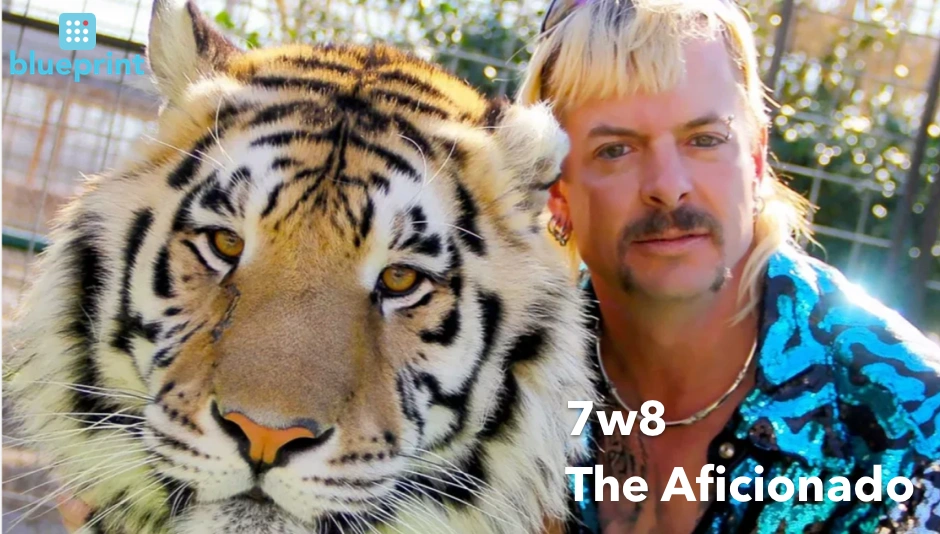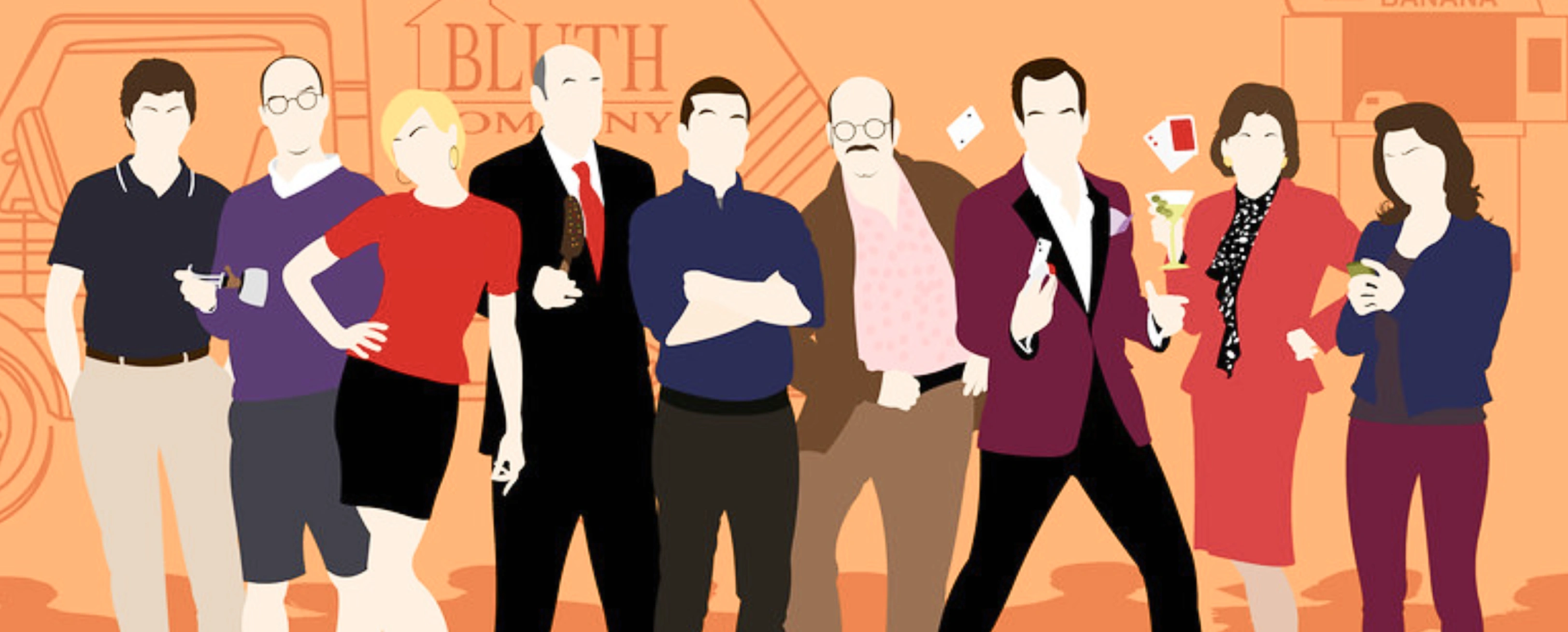Joe Exotic is the real star of Tiger King ( read our analysis of his Enneagram type here ), but because even the secondary cast has such big personalities, we wanted to do a quick analysis of the standouts.
We'll examine their personality types using the Enneagram here, highlighting and analyzing the cues we think are most important in identifying their types. The Enneagram types we’ve assigned to Carole, Jeff, and Doc are our best guesses, given our observation of their motivations, decisions, behaviors, speech, body language, and more. We’ll explain which type we think they are and why, using examples when relevant.
Note that type descriptions below come from Blueprint, our Enneagram app . And of course, spoilers for Tiger King, Tiger King 2, and Tiger King: the Doc Antle Story are up ahead.
What Enneagram type is Carole Baskin?
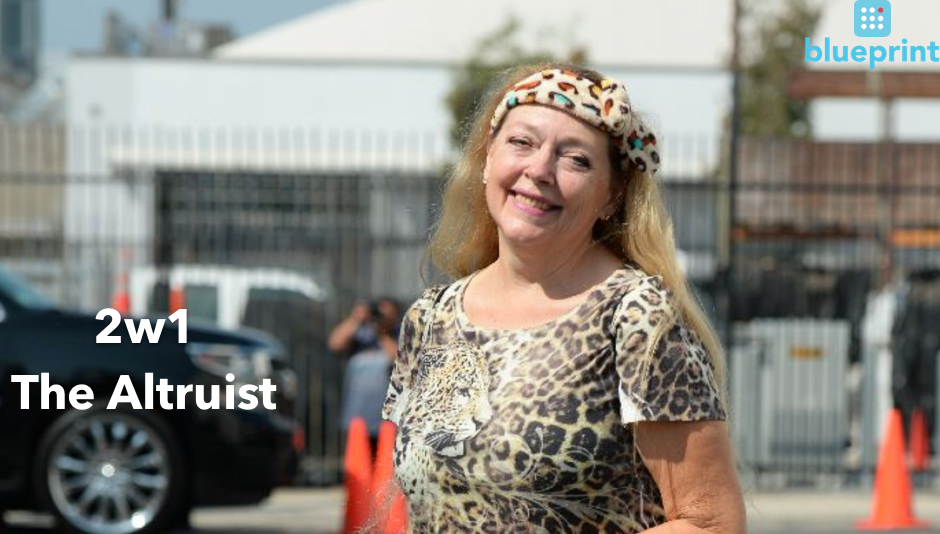
Our best guess for Carole Baskin is a low-health Two with a One wing (the Altruist): the Altruist is loving, compassionate, encouraging, devoted, well-intentioned, serving, worrying, guilt-ridden, and passive-aggressive. They are warm-hearted and truly charitable, but can be self-critical and victimized.
Twos define themselves by their desire to be loved and needed. Yet under stress, they devolve into martyrs with an aggressive streak who lash out at those who don’t appreciate them. Being an unloved, unappreciated “victim” gives low-health Twos an identity from which they seek the attention they want most. It’s irritating to everyone involved, but playing the victim gives Twos the appreciation they seek. The One wing adds to the desire to be seen as “good” and “moral,” traits which Carole plays up through running a cat rescue sanctuary. It’s up for debate whether she’s rescuing these animals or exploiting them much in the way of her rivals, as the line between conservation and objectification is thin, but it’s clear that she derives a strong sense of identity from being a “savior.”
Low-health Twos are also notorious oversharers, people who spend so much time in their feelings that they have trouble telling apart what’s TMI and what’s a normal level of disclosure. In their eagerness to form emotional bonds, they come on too strong, too soon. For example, Carole posting years of her personal diary entries online , often with cringe-worthy details? That’s TMI.
Lastly, female Twos (particularly those with a dominant Self-Preservation instinct) tend to have a “cutesy” and exaggerated style of dressing. One look in Carole’s cat-print closet and you see that she fits the bill here.
What Enneagram type is Jeff Lowe?
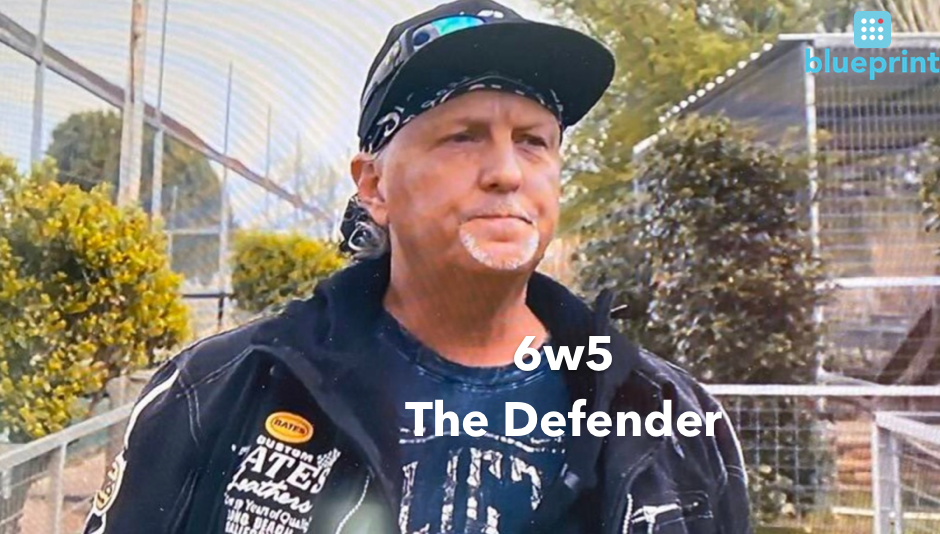
Our best guess for Jeff Lowe is a counterphobic low-health Six with a Five wing (the Defender): the Defender is trustworthy, understanding, analytical, committed, vigilant, political, cynical, pessimistic, and anxious. They are intellectual thinkers who champion the underdog, but can be overzealous and conniving.
The type of covert campaigning, subterfuge, and conning that Jeff seems to pull with nearly everyone who’s ever interacted with him is classic for a Six. Defenders under heavy stress can become highly suspicious, obsessive, and intensely anxious. They may look to exert control over people and things as a way of feeling more secure, including through covert schemes to undermine others. Their thinking becomes more binary and authoritarian: people are with the Six or against him. Sixes live by a “keep your friends close and your enemies closer” policy, which Jeff appears to have enacted by becoming business partners with his worst enemies and snitching to the Feds. His own survival and self-interest are paramount.
Defenders go to great lengths to retain their security. In the process, rage, paranoia, and outbursts of self-destructive behavior can result (as we can see through Jeff’s tendency to overdo alcohol , sex, and other vices). He also has a demeanor that suggests he’s trying a bit too hard to appear casual and unbothered by the wake of destruction around him, and is likely hiding a deep-seated fear that he’ll be the next casualty of the Tiger King world.
Counterphobic Sixes engage in this faux “puffing up” to look aggressive while shielding their anxiety. Jeff appears to default to a counterphobic fear response more often than Doc Antle, who is likely also a 6w5 (we’ll discuss him next). Sixes have the most variability of any of the Enneagram types in how they come off, both because the type often moves between extremes and because the phobic/counterphobic response can greatly change their appearance.
Lastly, Sixes’ chief defense mechanism is projection, whereby they accuse others of doing what they themselves have done (e.g., cheating on their spouse, then accusing their spouse of cheating on them). Despite being the common denominator in a host of cons, fraud, and failed relationships, Jeff is always pointing the finger at the other party, from Tim Stark to Joe Exotic to James Garretson.
What Enneagram type is Bhagavan “Doc” Antle?
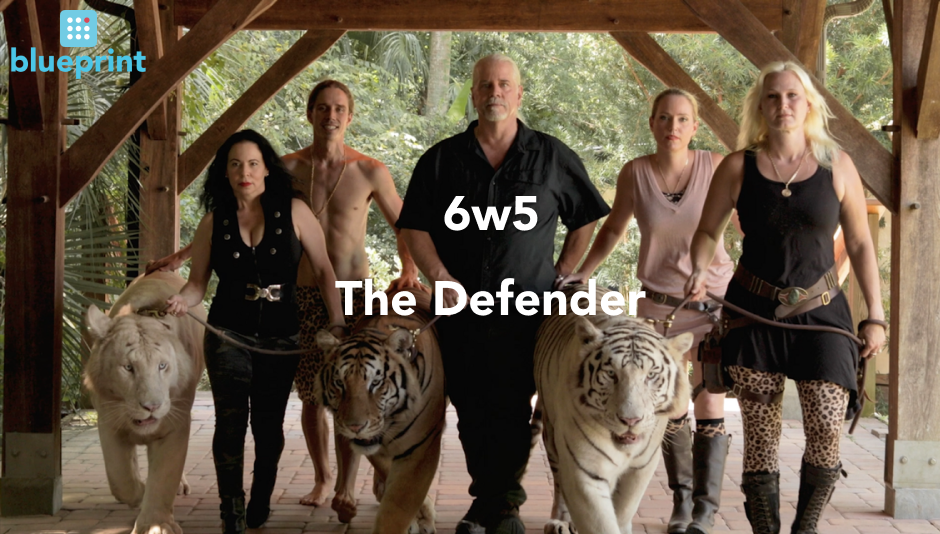
Our best guess for Doc Antle is a low-health Six with a Five wing (the Defender): the Defender is trustworthy, understanding, analytical, committed, vigilant, political, cynical, pessimistic, and anxious. They are intellectual thinkers who champion the underdog, but can be overzealous and conniving.
We didn’t get to see much of Doc Antle in Tiger King, and the little we did see suggested that he’s a Five because of his focus on concepts and knowledge over people. He tends to lead with his expertise in the realm of exotic animals, avoiding questions about his personal life (which is, by all accounts, pretty wild ). His vibe of “expert but somewhat socially awkward” seems to fit with the average Problem-Solver (a Five with a Six wing).
But when we went deeper by watching Tiger King: The Doc Antle Story, a three-episode follow-up that Netflix released in 2022, what we saw changed our conclusion. Instead of being motivated by competence and having enough resources like a Five, Doc seems more driven by having security and total control over his existence like a Six. We believe he’s a low-health Defender (a Six with a Five wing) who has a particularly strong Five wing.
Sixes have a mixed relationship with authority, shifting between following it devotedly, rebelling against it, and trying to cultivate it for themselves. Doc learned much of his tactics for building a cult-like following from an Indian guru named Swami Satchidananda at a yoga commune. Doc spent years idolizing and emulating Satchidananda.
When he built his own wildlife preserve, Doc employed tactics he learned from the guru: he brought on only the most zealously devoted followers, assigned devotees new names, isolated them from their families, broke down their sense of individuality and self-worth, and deliberately kept factions of people separate so no one would have a full picture of what Doc was doing. If someone had a special attachment to an animal, Doc would torture that animal as a means of gaining compliance from that person. He hates to be challenged, especially in front of others, because he doesn’t want his authority to be questioned or compromised. Sixes, particularly Defenders, are strategic thinkers who are skilled at carrying out these sorts of long-term interpersonal campaigns. They also tend to manipulate by undermining and isolating others from their support systems.
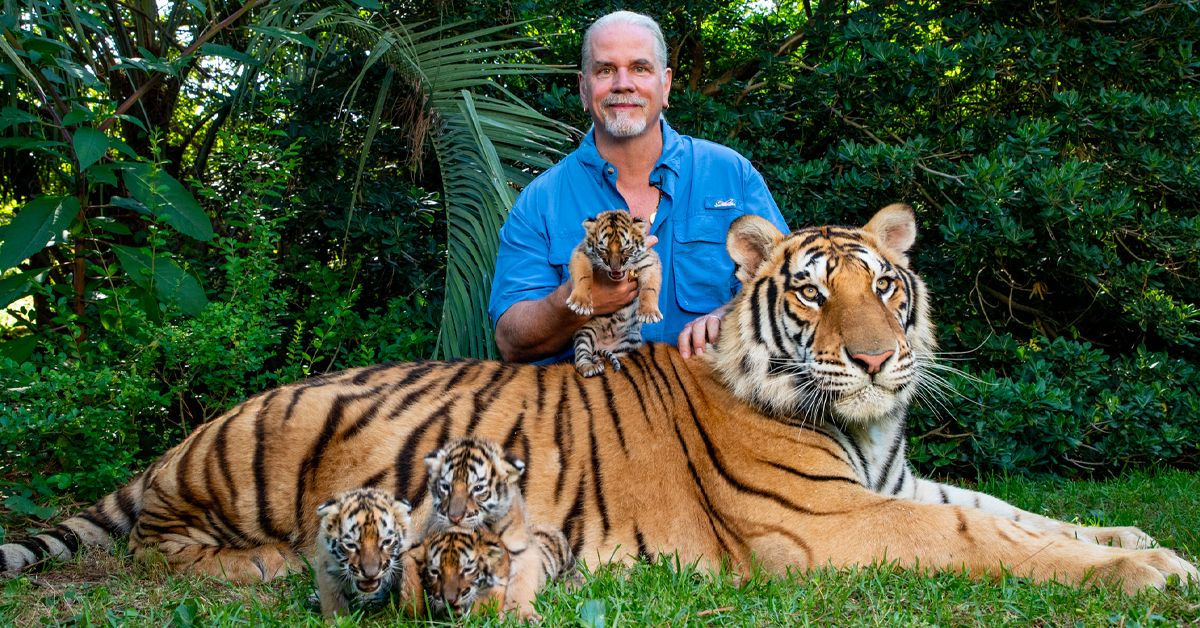
Low-health Defenders try to control other people and things as a way of feeling more secure themselves, which often leads them to run covert schemes to bring others down. Repeated statements from interviews with past “disciples” showed that Doc’s primary goal was to cultivate his own isolated world where he was in control, then lure women into it and exploit them. The fact that many of these women were underage is especially concerning. Doc would use his exotic animals to lure in devotees, preying upon their genuine care for wildlife to justify giving his staff abysmal living conditions and minimal pay. He systematically deprived his staff of resources, then presented himself as the sole source of support. As his former wife Radha said, “He needed to be the only source of comfort that any of us were allowed to have.”
Doc has a fast and loose relationship with the truth. He claims to be an MD and PhD, yet can’t produce the paperwork to support it. His alleged degree is in “Mystical Science” (what that means is anyone’s guess) from somewhere called the Chinese Science Foundation , which doesn’t appear to be an actual accredited university. If he were a Five, his core focus would be on gaining expertise; Fives tend to hoard information and have trouble thinking of themselves as masters when there’s so much more to be learned. In contrast, Sixes want to become the authority others trust: Doc leads with how he’s an expert, despite having suspect credentials at best. He also sought to create a network of people who were dependent on him, which resulted in interpersonal drama. Fives tend to see this sort of personal entanglement as detrimental to their core goal of gaining competence.
Unsurprisingly, Doc is upset at his depiction in the docuseries. He comes off two-faced, controlling, predatory, and hypocritical. Interviewees describe Doc as being very charming and showy, constantly pointing out expensive items like his Porsche and DeLorean, and yet he makes his “harem” bunk together in run-down cabins. His first wife said, “Bhagavan is an egocentric narcissist who really believes that he is one of the tigers. He’s the main tiger at his zoo. And he’s very far from it.” Aside from the pedophilia allegations, which are obviously troubling, it’s suggested that Doc may have pushed his former friend and coworker off a cliff during a hike because “he couldn’t have someone out there who knew his secrets.”

